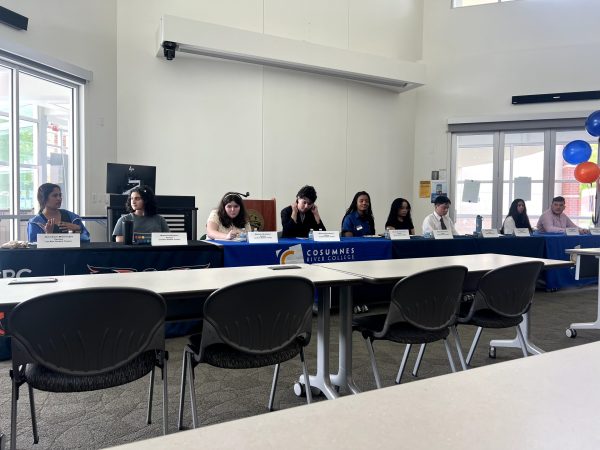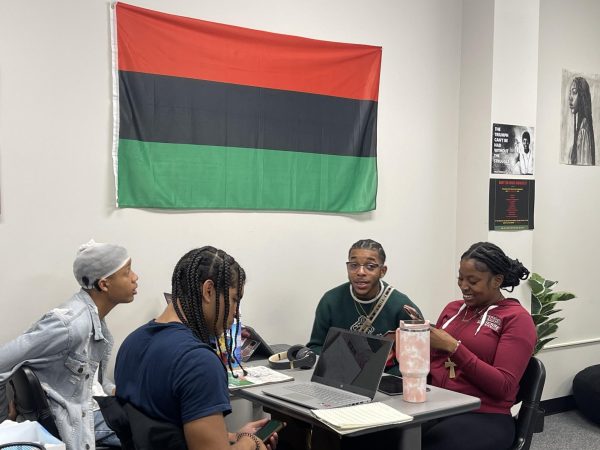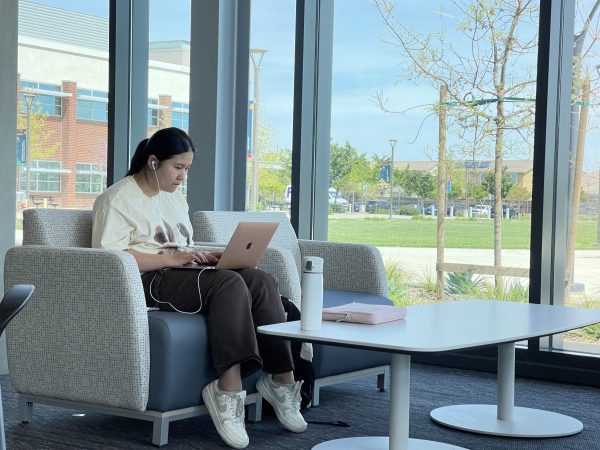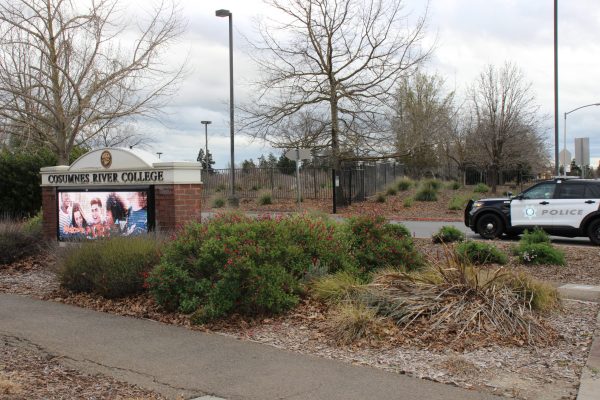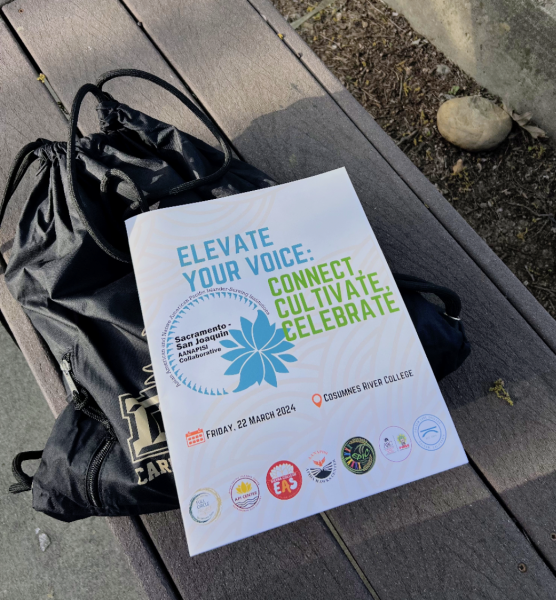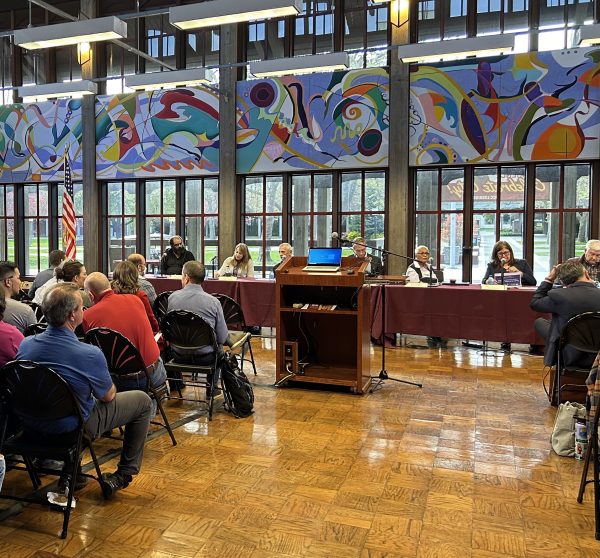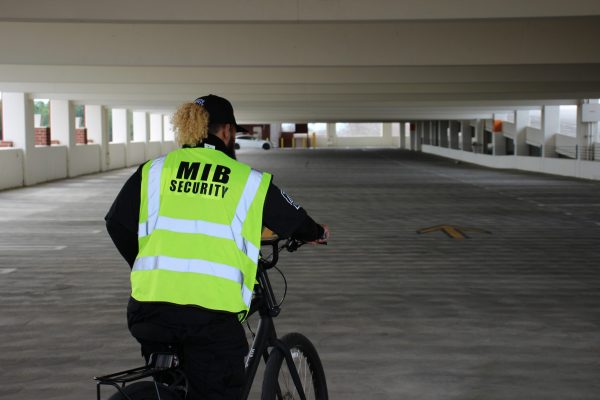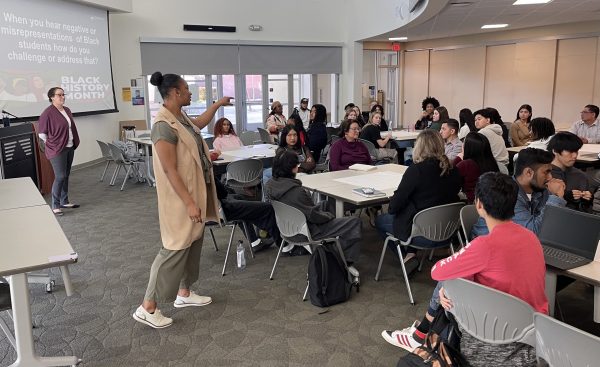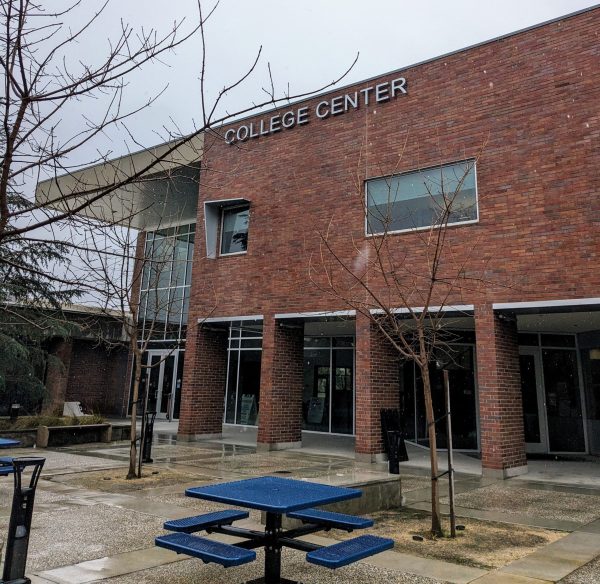Author speaks about water conservation, sustainability at OneBook keynote event
Elizabeth Royte, the author of this year’s OneBook Project selected reading, was interviewed by Students for a Sustainable Future Club President Jaime Gonzales about her book “Bottlemania: Big Business, Local Springs, and the Battle Over America’s Drinking Water ” on April 29.
Taking place in the recital hall, a full and engaged audience listened to the pair discuss topics ranging from climate change, bottled water alternatives, waterways and current legislation.
Royte who has authored other books such as “Garbage Land: On the Secret Trail of Trash” and written for publications like National Geographic and New York Times Magazine had specific reasons for wanting to visit Cosumnes River College.
“I’ve never been to Sacramento and I’m fascinated by California. I’m also a big fan of Joan Didion who grew up in Sacramento and has written very eloquently on water issues,” Royte said.
“I’m so happy that all of the students are reading my book so I wanted to honor their interest and come and talk to them,” she said.
Gonzales began by interviewing Royte and then then the floor was opened for audience questions.
One of Gonzales’ first questions to Royte was about the effect she thinks her books has had on sustainability efforts, overconsumption and waste.
“After the book came out, I was happy to see that the rate of increase of plastic water bottles went down and stayed down for a couple of years, but I can’t really take credit for it because I think that the economy had a lot to do with it and also there were a lot of activist groups out there and I want to give them credit,” Royte said.
Royte said that that the amount of people who purchase plastic water bottles is a number that constantly fluctuates and has since risen again. She went on to discuss one big problem that using so many plastic bottles is creating especially in developing nations who do not have the means to deal with it.
“Every year we are putting 8 million tons of plastic into our oceans,” Royte said.
Later on in the interview, Gonzales asked Royte her opinion on why it is so difficult for states to pass laws to enforce recycling and whether or not recycling is really the solution to the world’s waste problem.
“Often times a proposed solution is to recycle bottles, however there are currently only 11 states in the U.S. that have current container deposit legislation,” Gonzales said. “Since the release of ‘Bottlemania,’ a number of states including Texas, Tennessee and Massachusetts have unsuccessfully attempted to pass unsuccessful container deposit legislation.”
Royte said that states have a hard time passing legislation because of a large amount of industry pushback and it can take years to achieve anything.
“Recycling is great, but it is something that we do at the end of the fight when other efforts to recover these resources have failed,” Royte said.
“Recycling is the last of the three R’s that comes last. First is reducing our consumption, and then reusing these materials and only when those aren’t possible do we recycle,” she said.
Recently introduced boxed water, an alternative to packaging it in plastic was also discussed, however Royte said that looking at how the boxes are disposed of determine how promising they are, which isn’t very in most cases. She also said that we need to move away from the entire idea of buying single use water products and instead drink from the tap.
“If you can avoid buying these containers whether they’re paper or plastic or metal use a reusable container,” Royte said.
Climate change and it’s affect on water usage and need as well as its effect on waterways and how well they can handle and process large amounts of water were also brought up.
Gonzales brought up Gov. Jerry Brown’s recent mandate that residents have to severely cut back on water usage while the industry continues to have a sort of free for all and asked Royte to elaborate on this idea.
“Utilities focus on residential units because their customers are residential,” Royte said.
“Everyone needs to scale back and industry has scaled back quite a bit over the years they have learned to do much much more with much much less water and even in conservation and efficiently there has been a lot of innovation in that area,” she said.
She also added that farmers have been doing a lot of ground pumping for water and will soon begin to be metered so their usage can be tracked.
Big businesses like Nestle and their monopoly on the industry as well as Royte’s future ventures that include some upcoming articles for National Geographic were also discussed before the floor was opened for audience questions.
Tyler Trunnell, a 21-year-old kinesiology major and attendee of the event who was very vocal during the audience discussion said that he enjoyed it and got a lot of good information for a paper he is writing for his English class.
“I have a class where we had to read Royte’s book this semester and we’re doing a nine page research paper so this will work as some of my evidence for my paper so I thought coming would benefit me,” Trunnell said.
“I’ve never seen an author in person and so I thought it was really interesting,” he said.
Gonzales said that although he was nervous, he felt the entire event went off great.
“I think it went really well,” Gonzales said. “Elizabeth and I had been talking for about a month and we’re both people who aren’t used to making public appearances like this so we both shared the nervousness, but after we got together this morning and started talking more as friends that all sort of melted away and we became much more comfortable. The audience just did a really great job at making us feel at ease and their questions were so great as well.”
After the event ended when asked if there was one thing that students took away from the experience what would she want it to be, Royte said that “your actions matter.”


